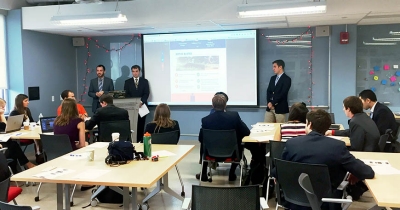Engineering Students Sell “Bad” Plastics

Teams in Dr. Noelle Comolli’s Polymers class present their plastics.
Teams are challenged to consider the big picture when presenting polymers.
“Today’s engineering education must prepare students to enter any career,” says Villanova University’s Drosdick Endowed Dean of Engineering Gary A. Gabriele, PhD. “One of the most important things we can do is to pique their curiosity, show them how to make connections between engineering and other disciplines, and help them understand how they can one day create value for an employer.” Those elements come together under the umbrella of entrepreneurially-minded learning (EML), and during the 2014-15 academic year, a number of faculty integrated EML into their courses in a variety of unique ways.
Chemical Engineering Associate Professor Noelle Comolli, PhD, brought the entrepreneurial spirit to her Polymers course. “Plastics have a real image problem,” she says. “Public perception is that there are countless ‘bad’ plastics affecting our everyday lives.” Working from this notion, Dr. Comolli presented her class with an innovative final project for the fall semester. “Plastics: The Good, the Bad, the Opportunity” tasked students with researching the scientific and non-scientific basis for the “bad” label on one of the many plastics that have been branded as such. Working in teams, students were then challenged with addressing public perception. They could rebrand their plastic through a marketing campaign, or adapt that product with new polymers or new additives and present the alternative.
Dr. Comolli explains how the assignment requires seeing the big picture: “Students have to thoroughly understand the course subject matter, but also realize the connections that exist outside of engineering the product. For example, they must consider environmental factors, the economics of manufacturing, and the importance of public perception.”
On the last day of class, Dr. Comolli’s student teams gathered in the Idea Accelerator, which is facilitated by Villanova’s Innovation, Creativity, and Entrepreneurship (ICE) Institute. There they presented scientific facts about their products in a way that a non-engineer could understand. They then delivered a “Shark Tank” style pitch to effectively sell their product to Dr. Comolli and fellow students. Teams also were required to create a prototype of their product, or display part of their marketing plan, and write a report summarizing their research and plan.
Ultimately, most of the teams decided to replace their polymer with one that was less controversial, even in cases where the research did not support the “bad” reputation of their original plastic. Some teams acknowledged the health risks or environmental concerns associated with their compound and recommended safer options. Various means were recommended for marketing their products, from social media campaigns to educational infographics.
Dr. Comolli concludes, “It is this deeper level of understanding, the ability to consider a variety of factors and perspectives when developing a product or service, which distinguishes Villanova engineers in the job market.”
